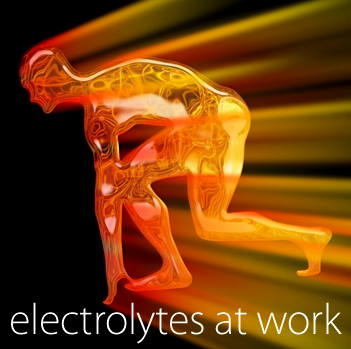news
What Causes Electrolyte Imbalance?
What Causes Electrolyte Imbalance?
Written by Christian Nordqvist in Medical News Today
What are electrolytes?
An electrolyte is a substance that produces an electrically conducting solution when dissolved in water. Electrolytes carry a charge and are essential for life. All higher forms of life need electrolytes to survive. In our bodies, electrolytes include sodium (Na+), potassium (K+), calcium(Ca2+), bicarbonate (HCO3–), magnesium (Mg2+), chloride (C1–), and hydrogen phosphate (HPO42-).
A muscle contraction needs calcium (Ca2+), sodium (Na+) and potassium (K+) to be present. Wrong electrolyte levels can lead to either weak muscles, or muscles that contract too severely.
Our heart, muscle and nerve cells use electrolytes to maintain voltages across their cell membranes and to carry electrical impulses to other cells.
The level of an electrolyte in the blood can become too high or too low. Body electrolyte levels tend to alter when water levels in the body change – when our level of hydration goes up or down.
Electrolyte levels are kept constant by our kidneys and several hormones. When we exercise we sweat and lose electrolytes, mainly sodium and potassium.
To maintain constant electrolyte concentrations in our body fluids, these electrolytes must be replaced. Fresh fruits and vegetables are good sources of sodium and potassium and replace lost electrolytes. Excess electrolyte levels in our blood are filtered out by our kidneys.
If we do not consume the necessary levels of electrolytes there can be health consequences. The most common imbalances are hypernatremia and hyponatremia (too much or too little sodium), and hyperkalemia and hypokalemia, (excessive and insufficient levels of potassium).
Doctors refer to a low electrolyte level with the prefix hypo- and to a high level with the prefix hyper-.
Elderly people and electrolyte levels
As older people are more susceptible to dehydration and over-hydration, they are also more prone to abnormal electrolyte levels. This is because our kidneys do not work as efficiently when we become elderly.
Some seniors who have mobility problems, and do not have daily access to help, may experience fluctuating levels of food and fluid intake – these two factors can have an impact on their levels of electrolytes.
Symptoms of electrolyte imbalance
An electrolyte imbalance can be manifested in several ways. The symptoms will depend on which electrolyte is out of balance, and whether that level is too high or too low.
An altered level of magnesium, sodium, potassium,or calcium may produce one or more of the following symptoms:
- Irregular heartbeat
- Weakness
- Bone disorders
- Twitching
- Blood pressure changes
- Confusion
- Seizures
- Numbness
- Nervous system disorders
- Fatigue, lethargy
- Convulsions
- Muscle spasm.
Hypercalcemia is a common disorder among cancer patients, especially those with breast cancer, lung cancer andmultiple myeloma. It often results from the destruction of bone due to bone metastases.
Signs and symptoms may include: frequent urination, irregular heart beat, lethargy, fatigue, moodiness and irritability, nausea, stomach pain, vomiting, extreme muscle weakness, being very thirsty, dry mouth or throat, total loss of appetite,coma, confusion and constipation.
As these symptoms may also be the result of the cancer itself or cancer treatment, it is sometimes difficult for hypercalcemia to be identified straight away.
Causes of electrolyte imbalance
- Kidney disease
- Vomiting for prolonged periods
- Severe dehydration
- Heatwaves – A report found that the number of cases of electrolyte imbalances increases significantly during heatwaves1
- Acid/base (pH) imbalance (acid and alkaline balance in the body is disproportionate)
- Congestive heart failure
- Cancer treatment
- Some drugs, such as diuretics or ACE inhibitors. A study revealed that 20% of patients taking diuretics commonly prescribed forhigh blood pressure or heart conditions end up with reduced sodium and potassium levels2
- Bulimia
- Severe and persistent vomiting and nausea during pregnancy.3
BlackMP includes Electrolytes
We know the importance of Electrolytes for our bodies, that’s why every BlackMP product includes electrolytes in addition to humic and fulvic minerals and probiotics. Learn more by visiting the Learn More about BlackMP Living Water tab above, or purchase now by visiting the BlackMP Store.

